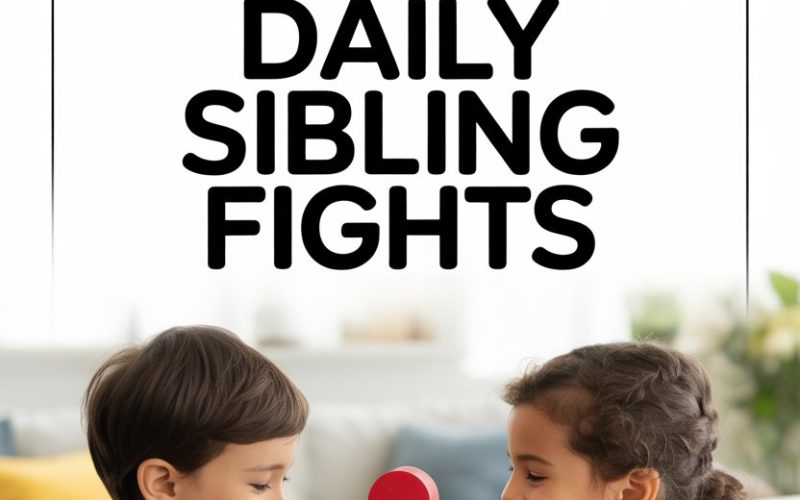If your household sounds like a cross between a zoo at feeding time and a courtroom drama—complete with passionate closing arguments and the occasional tossed stuffed animal—you’re not alone.
Sibling spats are as much a part of family life as lost socks and questionable science projects. But when it feels like you’re running the United Nations rather than a family, it’s time for a fresh strategy.
Here are five practical, sanity-saving approaches to transform those daily squabbles into something closer to sibling harmony (or, at least, a minor ceasefire).
1. Spot the Triggers Before the Eruption
Kids never schedule their battles at a convenient time, do they? Just as you sit down with a cuppa, the bickering begins.
The trick isn’t to wait for the yelling to start, but to play detective and look for patterns. Are your children more likely to clash when they’re tired, hungry, or both? (Hint: The answer is almost always ‘yes’.)
Plenty of research supports the notion that fatigue, low blood sugar, and boredom are common culprits behind sibling strife.
Pediatric psychologist Dr. Laura Markham, who literally wrote the book on peaceful parenting, suggests parents keep an eye out for these patterns.
Maybe it’s the witching hour before dinner. Or when one child finishes their chores and the other hasn’t even started.
Once you’ve spotted the triggers, you can put a plan in place. Snack time before tantrum o’clock. A ‘quiet time’ after school where everyone decompresses with a book or some headphones.
Sometimes prevention is less about refereeing arguments and more about preemptively feeding the monsters (the hungry, tired ones—not your kids, obviously).
2. Give Them the Tools to Battle With Words—Not Fists
No child enters the world knowing how to calmly say, “I’m frustrated you took my toy, but I’d like it back, please.” If they did, we’d all be out of a job.
Instead, most kids go straight for the screech or the right hook.
Teaching them how to argue (yes, really) can be a game changer. According to child development experts from the Child Mind Institute, naming feelings is the first step.
Model language like, “I feel upset when you grab my things,” or, “I need some space.”
Role-play for a few minutes when tempers aren’t running hot. Take turns being the aggrieved party and the accused. Sure, you’ll feel ridiculous, but that’s part of the fun.
And when it works in real life? You’ll be too busy high-fiving yourself to care.
Consider a visual aid: a simple ‘Feelings Chart’ on the fridge, or even a traffic light system (green for calm, yellow for warning, red for ‘I need help, Mum!’) can make emotions less intimidating and more manageable.
3. Praise Peace Like It’s an Olympic Sport
Let’s be honest, parents have a sixth sense for pouncing on trouble. The silent stretches? That’s when you finally answer emails or scroll Instagram.
But kids notice when attention only comes with bad behaviour. The trick is to catch them being kind.
A study published in the Journal of Applied Behavior Analysis found that simply praising children for co-operating reduced aggressive outbursts by half.
Instead of waiting for squabbles, look for moments when they’re sharing, helping, or even just ignoring each other peacefully. (“Wow, you two are playing so nicely—I love seeing that.”)
Don’t worry about sounding cheesy. To a child’s ears, parental praise is gold.
Think of it as a daily challenge: find three moments to praise. Make it specific—“Thanks for giving your brother a turn with the remote,” or, “You used your words to sort that out—brilliant!”
Rewards don’t need to be grand gestures. An extra bedtime story, a sticker on a chart, or just a massive bear hug can be all the motivation they need to make peace the new normal.
4. Set Boundaries—and Enforce Them Like a Benevolent Dictator
Children can sniff out inconsistency faster than a bloodhound. One day, you ignore the wrestling match on the rug; the next, you’re threatening to confiscate every toy in the house. Cue confusion (and more drama).
Clear, consistent boundaries are your best friend. Decide what’s absolutely not allowed—hitting, name-calling, property destruction (even if the glitter glue was ‘an accident’).
State the rules simply, and post them somewhere everyone can see. “In our house, we use gentle hands and kind words.”
When the line gets crossed, follow through, calmly and every time. No last-minute negotiations or sliding scales based on who started it.
Many experts, including Harvard’s Center on the Developing Child emphasise that consistent routines help children feel safe and reduce anxiety-driven conflicts.
If a consequence is time out, make it short and age-appropriate. If it’s loss of a privilege, ensure it’s logical. (“You fought over the tablet, so the tablet is having a rest.”)
It’s not about being harsh. It’s about being so reliable that your kids can finish your sentences (and maybe, eventually, stop needing quite so many reminders).
5. Encourage Teamwork—Because Nothing Bonds Like a Common Enemy (Even If It’s Just Laundry)
Nothing unites children like a shared goal—especially if it involves beating the grown-ups at something. Sibling rivalry has a sneaky way of dissolving when kids need to work together.
Try assigning little missions that require teamwork. Build a fort together that can withstand a cushion avalanche.
Set a timer and challenge them to tidy the playroom faster than you can fold laundry (yes, you’ll probably lose, and that’s the point). Or get them to bake biscuits together, with each one responsible for a different step.
Psychologists call this ‘shared positive experiences’—translation: kids are too busy plotting against you (the fun way) to fight each other.
According to research from the University of Illinois, children who collaborate regularly develop empathy and conflict resolution skills that stick for life.
If competitive energy runs high, award silly medals for ‘Best Team Spirit’ or ‘Least Amount of Rolling Eyes’.
Sometimes, all it takes is reminding siblings that, as exasperating as they find each other, they’re on the same team—at least until next Tuesday.
Some Days Will Still Be Loud
No magic trick will turn siblings into besties overnight. Sometimes, your only job is to keep everyone alive, fed, and (mostly) clothed until bedtime.
But finding the triggers, teaching how to argue, praising the peacemakers, enforcing those boundaries, and encouraging teamwork can turn daily battles into teachable moments.
The best bit? These are skills that last a lifetime—long after the last Barbie shoe has been fished out of the toilet.
And on days when nothing works, a well-timed biscuit and a group cuddle might be just what the peace process needs.




